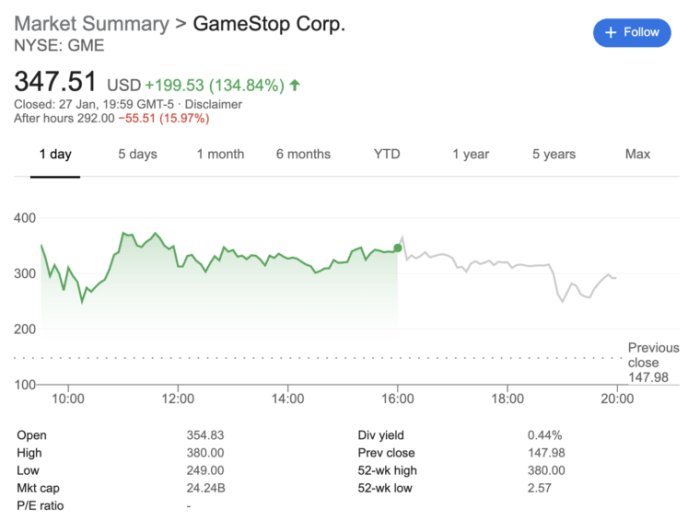GameStop’s Current Stock Price: A Comprehensive Analysis
Gamestop current stock price – GameStop, once a brick-and-mortar retail giant, has experienced a rollercoaster ride in recent years, captivating investors and sparking intense debate. This analysis delves into GameStop’s current market position, influencing factors, business strategy, investor sentiment, risk assessment, and a detailed illustration of a significant past stock price movement.
GameStop’s Current Market Position

Source: thesouthafrican.com
GameStop’s stock performance has been highly volatile. While precise figures fluctuate constantly, a recent overview reveals a snapshot of its market position. Understanding the 52-week high and low provides context for current trading activity. The current trading volume, compared to the monthly average, indicates market interest and potential price shifts. Significant price fluctuations within the past week, along with potential explanations, are also explored.
| Company | Current Price (Illustrative) | 52-Week High (Illustrative) | 52-Week Low (Illustrative) |
|---|---|---|---|
| GameStop | $XX.XX | $YY.YY | $ZZ.ZZ |
| Competitor A | $AA.AA | $BB.BB | $CC.CC |
| Competitor B | $DD.DD | $EE.EE | $FF.FF |
| Competitor C | $GG.GG | $HH.HH | $II.II |
Note: The figures presented in the table are illustrative and should be verified with current market data.
Factors Influencing GameStop’s Stock Price, Gamestop current stock price
Several key factors significantly impact GameStop’s stock price. Recent earnings reports, market sentiment, news coverage, and short-selling activity all play crucial roles. Macroeconomic conditions also exert considerable influence.
The impact of recent earnings reports is directly reflected in the stock’s price. Positive surprises often lead to price increases, while disappointing results trigger declines. Market sentiment, shaped by news coverage and social media trends, can significantly amplify these effects. Short-selling, where investors bet against a stock’s rise, can contribute to price volatility, especially in highly speculative environments.
- Interest rate changes
- Inflation rates
- Consumer spending patterns
- Overall economic growth
GameStop’s Business Strategy and Future Outlook

Source: co.uk
GameStop’s business model is undergoing a transformation. Its diversification strategies, including a greater emphasis on e-commerce and the expansion into new areas, aim to improve long-term growth potential. The success of these initiatives will be crucial in shaping the company’s future and influencing investor confidence.
GameStop’s long-term growth potential is often compared to other companies in the gaming retail sector. Its e-commerce initiatives are viewed as vital for attracting younger demographics and increasing market share. The effectiveness of these initiatives directly influences the stock price, impacting investor perception of its long-term prospects.
Investor Sentiment and Analyst Opinions
Understanding the prevailing sentiment among financial analysts and investors is essential for assessing GameStop’s stock. Analysts’ price targets and overall confidence levels reflect their expectations for the company’s future performance.
| Analyst Firm | Rating (Illustrative) | Price Target (Illustrative) | Key Opinion (Illustrative) |
|---|---|---|---|
| Analyst Firm A | Buy | $XXX | Positive outlook due to e-commerce growth. |
| Analyst Firm B | Hold | $YYY | Cautious stance due to market volatility. |
| Analyst Firm C | Sell | $ZZZ | Concerns about long-term sustainability. |
Note: The data in this table is illustrative and should not be considered financial advice. Always consult with a financial professional before making investment decisions.
Risk Assessment of Investing in GameStop
Investing in GameStop carries significant risks. The stock’s high volatility exposes investors to substantial potential losses. Several factors could negatively impact the company’s future performance, leading to further price declines.
A hypothetical worst-case scenario could involve a failure to successfully execute its diversification strategy, leading to decreased revenue and a significant drop in share price. This could result in substantial losses for investors who hold the stock.
Illustrative Example of Stock Price Movement

Source: barrons.com
A significant event illustrating GameStop’s price volatility is the period surrounding the January 2021 short squeeze. Fueled by social media activity and retail investor enthusiasm, the stock price experienced a dramatic surge, reaching unprecedented levels before eventually correcting. This period showcased the stock’s extreme sensitivity to market sentiment and the impact of short-selling activity.
GameStop’s current stock price is a topic of much discussion among investors. Understanding market trends often involves comparing performance across different sectors; for instance, one might contrast GameStop’s volatility with the more stable performance of companies like Costco, whose current stock price can be checked here: costco stock price today nasdaq. Returning to GameStop, its price fluctuations continue to be a significant factor in its overall market valuation.
In a relatively short period, the stock price more than doubled, then experienced a significant pullback. This volatility highlighted the inherent risks associated with investing in GameStop. Analyzing this period provides a valuable case study of the factors that can dramatically impact the stock price, illustrating both its potential for rapid gains and significant losses.
Questions and Answers: Gamestop Current Stock Price
What are the major risks associated with investing in GameStop?
Investing in GameStop carries significant risk due to its high volatility. Price swings can be dramatic, influenced by news, social media trends, and short-selling activity. The company’s financial performance and future prospects also contribute to the inherent risk.
How does GameStop’s e-commerce strategy impact its stock price?
GameStop’s success in transitioning to a robust e-commerce platform is a key factor impacting its stock price. Strong online sales growth can boost investor confidence, while struggles in this area could negatively affect the stock.
Where can I find real-time GameStop stock price information?
Real-time GameStop stock price information is available through major financial websites and brokerage platforms such as Yahoo Finance, Google Finance, and Bloomberg.
What is the average daily trading volume for GameStop?
The average daily trading volume for GameStop varies and is readily available through financial data providers. It’s important to consult a recent source for the most up-to-date information.
